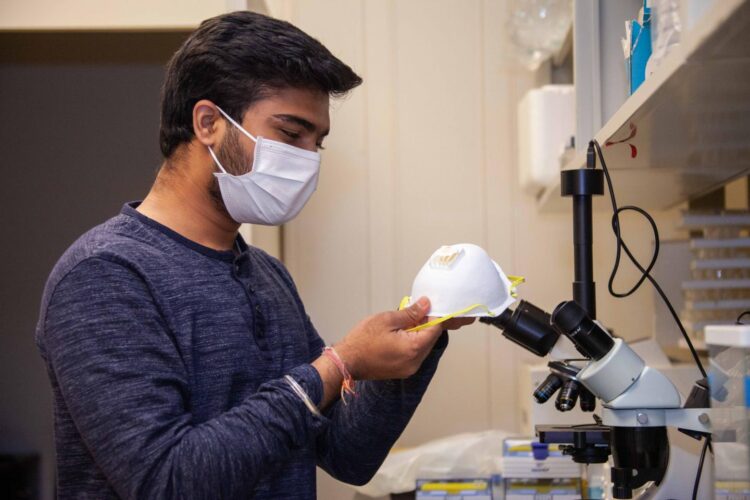Leaks around the edges of masks increase infection risk
Even the best face masks work only as well as their fit.
And poorly fitting face masks greatly increase the risk of infection from airborne pathogens compared to custom-fitted masks, according to a new study by the University of Cincinnati.
Researchers in UC’s College of Engineering and Applied Science used computerized tomography or CT scans of three different-sized face masks attached to three different-sized dummy heads to measure the gaps between the face and the fabric. Then they calculated the leaks from these gaps to determine the infection risk.
They found that while N95 masks are effective barriers against airborne diseases like COVID-19, poorly fitting masks can have substantial leaks around the face that reduce their effectiveness and increase the risk of infection.
“Many people do not realize that the fit of face masks can vary. There are different face shapes and different sizes of masks,” said Rupak Banerjee, a professor in UC’s Department of Mechanical and Materials Engineering.
“If you do not match them well, you can lead to greater leaks and higher risks of infection,” he said.
The study was published in the Nature journal Scientific Reports.
Banerjee collaborated on the study with his former students, including UC graduates Prasanna Hariharan, Neha Sharma and Gavin D’Souza. Hariharan, the study’s lead author, works for the U.S. Food and Drug Administration’s Division of Applied Mechanics.
UC’s use of CT scans improved the accuracy of contact modeling from previous studies that relied on gap geometry and computational models for estimates.
UC used three different sized N95 face masks from the National Institute for Occupational Safety and Health along with three standard mannequin heads identified as small, medium and large. From the CT scans, they could create a 3D computer-aided design model that showed the gaps between the masks and the face on each subject.
They calculated the airflow rates through the gaps to identify the relative infection risk for each mask on each face.
The aerosol transport attributed to leaking out the sides of the masks varied from as little as 30% to as much as 95% for the worst-fitting masks. Researchers found the leaks were most likely around the nose. Interestingly, they noticed that the gaps were often asymmetrical on the symmetrical dummy faces.
Researchers found that poorly fitted face masks can as much as double the infection risk to the wearers and people around them.
“A lot of people don’t wear masks properly. They keep the nose exposed, which isn’t helpful,” Banerjee said.
But understanding that masks can often leak around the nose could help people pay more attention to the fit when buying and wearing masks.
Editor of the American Society of Mechanical Engineering Journal of Medical Devices, Banerjee said innovations in infection control have been hot topics this year.
“We are going to have a special issue soon about pandemic-response medical devices, including face masks and face shields,” he said.
Meanwhile, UC’s research could educate consumers and help manufacturers design better-fitting masks, he said.
While many countries are relaxing social-distancing mandates, Banerjee said he isn’t putting his face masks away just yet.
“I’ll continue to wear a face mask because of the risk from the COVID-19 variants,” he said. “We’re still not sure how effective the vaccine is on the variants. So it’s a good idea to continue wearing masks in gatherings for now.”
###
Media Contact
Michael Miller
[email protected]
Original Source
https:/
Related Journal Article
http://dx.





